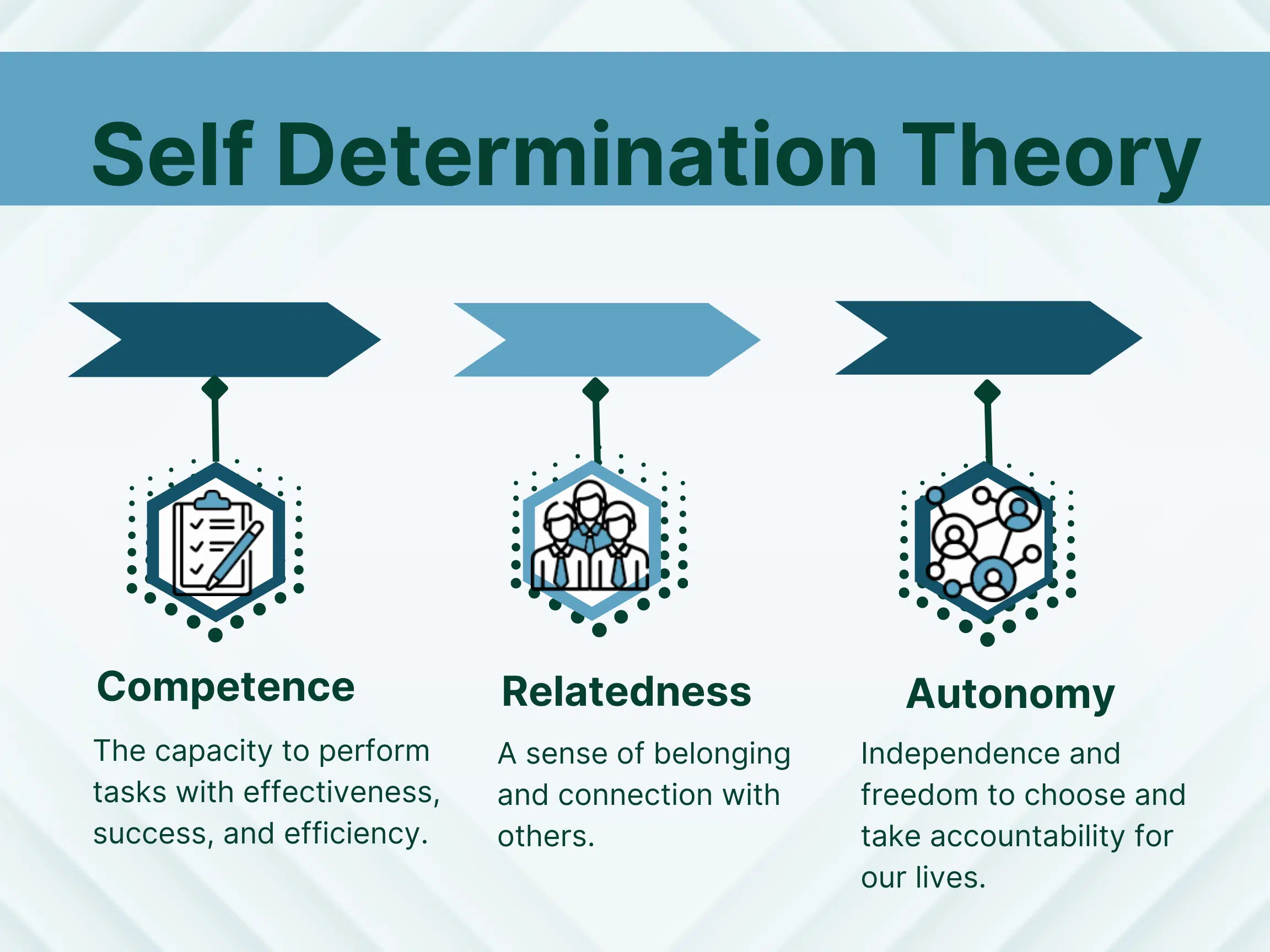Decoding Excellence: Unlocking the Secrets of Self-Determination
We all desire to learn, grow, connect, and reach our full potential. Self-determination theory is a framework to help us understand motivation both on intrinsic and extrinsic levels and drive optimal functioning and performance. Self-Determination theory suggests that fulfilling three fundamental psychological needs can help us achieve self-determination. This blog will examine each self-determination need of competence, relatedness, and autonomy, what leaders can do to support and empower these needs and pose self-reflective questions to unlock your potential. Getting in touch with these core needs leads to a more productive experience at work and in life.
Competence:
Competence is building mastery by doing something effectively, successfully, or efficiently. Continually developing our skills and leaning on our strengths and abilities is essential to feel competent. For example, learning new technology and acquiring knowledge in a specific area contributes to our sense of competence and self-efficacy. We broaden and build our skills and capabilities and increase self-confidence by pushing ourselves outside our comfort zones and embracing new challenges.
What Leaders Can Do?
A culture built on psychological safety encourages learning and feedback. As leaders, schedule times to offer feedback to your employees, highlight their strengths, and recognize their achievements. Engage employees and inquire about their professional learning and development goals and discuss opportunities for skill development, training, and cross-training. This promotes and fulfills the important need for competence.
Self-Reflective Questions:
- How do you experience competence in the workplace?
- What are your strengths?
- What are your goals for areas for growth?
- What skills do you want to develop?
- In what areas do you challenge yourself?
- What accomplishments are you most proud of, and why?
Relatedness:
Evolutionary human beings need to belong, relate and be in relationships with others. Previously, we would languish or die during the caveman era if we left our tribe to hunt and gather independently. Conversely, when we relate and work collaboratively towards a shared goal, we flourish and thrive as part of a tribe or team. Establishing and fostering meaningful relationships and relating to others is good for our well-being, happiness, and satisfaction. Lastly, feeling acknowledged, appreciated, supported, validated, and recognized in the workplace makes us feel well-connected and that our contributions make a difference.
What Leaders Can Do?
Leaders can foster a culture that builds and strengthens relatedness through team-building activities and experiences in and outside the workplace. This promotes and fulfills the critical and necessary need for relatedness, connection, and community.
Self-Reflective Questions:
- How do you relate to people in the workplace?
- What types of relationships bring you fulfillment?
- Who are the people in your life that support and inspire you?
- How do you actively nurture and maintain meaningful connections?
- How do you influence others positively or negatively?
Autonomy:
Autonomy refers to the independence, control, and freedom to choose, take accountability, and have agency and ownership of our lives and choices. We all can shape our destinies by setting and achieving goals and aligning our values and aspirations with committed action steps. Prioritizing this, we can create a life that genuinely reflects who we are and what we want to achieve.
What Leaders Can Do?
Instead of a command and control and authoritarian leadership stance undermining this need for autonomy, a psychologically safe culture embraces autonomy, accountability, and agency. It empowers employees to make decisions, embraces mistakes as learning opportunities, and encourages employees to take ownership of their projects to drive high performance, creativity, and innovation. Leaders can empower their employees’ autonomy by encouraging initiation, agency, accountability, participation, and recognition of each person’s skill set. This promotes and fulfills the important need for autonomy.
Self-Reflective Questions:
- What are your aspirations?
- What are your core values and beliefs?
- How do you make decisions that align with your values and aspirations?
- How do you take accountability and responsibility for your actions and life’s direction?
Conclusion:
Self-determination theory teaches us that by satisfying our innate psychological needs for competence, relatedness, and autonomy, we can unlock our potential and lead more fulfilling lives. By developing our skills, overcoming challenges, building meaningful relationships, and embracing agency, we can become self-determined individuals motivated to grow and change. As leaders, incorporate how you can create strategies to inspire and develop your employee’s core needs of competence, relatedness, and autonomy.
Recommended Reading:
3 Ways to Motivate Your Team Through an Extended Crisis by Anne M. Brafford and Richard M. Ryan
Forget Flexibility. Your Employees Want Autonomy by Holder Reisinger and Dane Fetterer
No Excuses: Being Accountable for Your Own Success by Linda Galind
“The only person you are destined to become is the person you decide to be.”
Ralph Waldo Emerson
Meet Jodie, your Culture & Transformation Captain. With over twenty years helping people change, facilitating team discussions, building cultures, designing, implementing and teaching classes, your organization is in good hands.




